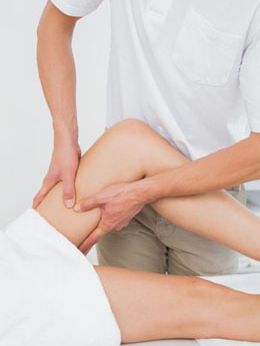Muscle pain in the thighs is usually caused by a range of factors such as arthritis, muscle strain, fractures, or diseases. Read on to know more about the causes, symptoms, and treatment options.

Thigh muscles comprise three different sets of muscles, the hamstring muscles in the back of the thigh, the quadriceps muscles in the front, and the adductor muscles on the inside. While the two former types work together to help us extend and flex our legs, the abductor muscles pulls your legs together. Outer and inner thigh pain is a common occurrence, especially, if you are prone to injures during sports. From quadriceps strains to fractured femur, the pain can be attributed to any of these causes. Sometimes deficiency of antithrombin, hip osteoarthritis or other diseases can cause pain in the thigh. Here is a look at the commonly observed causes, symptoms and treatment of muscle pain in the thighs.
Causes
Thigh Muscle Strains: A tear of the quadriceps or the hamstring muscles can occur after strenuous activities like sprinting, jumping, or kicking. You can observe mild to severe thigh muscle strains in sprinters and hurdle jumpers. The symptoms of the strain will vary based on the severity of it. For example, a mild strain can result in a slight twinge and tightness in the legs, it may also lead to discomfort while walking. This is in contrast to the severe strains that you observe in severe thigh pain, that lead to an inability to walk without support, swelling, and bruising.
For treating this pain, cold therapy may be used. This along with stretching and strengthening thigh exercises, can help fasten the healing process. There are several factors such as muscle fatigue, poor conditioning, and muscle imbalance that may predispose you to muscle strains in thighs.
Osteoarthritis: Degenerative arthritis or osteoarthritis can affect the bones and joints including articular cartilage and the subchondral bone. This leads to sharp aching pain in the muscles and tendons of the affected area. When osteoarthritis affects the hip or knee, you may experience spasms and muscle contractions in the thighs. The result is the occurrence of certain symptoms like stiffness, swelling and impaired movement. Hereditary factors, diabetes, joint injuries, obesity, and many other factors are to blame for this condition. Treatment includes rest, moderate exercises, and relaxation techniques.
Sciatica: If you experience cramping in the legs and thighs along with shooting pain and sharp tingling, then you might be suffering from sciatica. This is caused by the inflammation of the sciatic nerve. The primary function of the sciatic nerve is to send signals to your muscles from the brain and collect sensory information from the legs and pass it back to your brain. With the condition affecting the nerves, there is a definite weakness of the leg muscles accompanied by pain in the legs and thighs. Along with rest and muscle relaxers, anti-inflammatory medications may be prescribed to treat the condition. Exercises and physical therapy is one of the best treatment options for sciatica.
Osteomyelitis: Bone or bone marrow infections result in osteomyelitis. This disease is caused due to the microorganisms by penetrating the bones, through local areas of infection. Thighs and upper arm bones are particularly susceptible to the problem. Apart from the sharp pain and weakness of the legs, other symptoms of osteomyelitis include fever, swelling, warmth, and redness. If the infection is through an open wound, then you might observe pus in the wound. Relief can only be achieved by prolonged antibiotic treatment
Cancer: Cancer such as osteosarcoma affects the arm bones, femur, tibia, and pelvis, and causes a dull pain in the thighs, often accompanied by swelling or redness of the skin. In addition to this, Ewing's sarcoma, a cancerous tumor that is found in the middle of the long bones in the body causes thigh pain, fever, and swelling of the affected region.
Inner and upper thigh muscle pain can be attributed to a range of factors. Your doctor may recommend the appropriate treatment based on the symptoms and causes. Thus it is best to take medical help before the problem aggravates severely.
Disclaimer:
This Buzzle article is for informative purposes only, and should not be used as a replacement for expert medical advice.


 Thigh muscles comprise three different sets of muscles, the hamstring muscles in the back of the thigh, the quadriceps muscles in the front, and the adductor muscles on the inside. While the two former types work together to help us extend and flex our legs, the abductor muscles pulls your legs together. Outer and inner thigh pain is a common occurrence, especially, if you are prone to injures during sports. From quadriceps strains to fractured femur, the pain can be attributed to any of these causes. Sometimes deficiency of antithrombin, hip osteoarthritis or other diseases can cause pain in the thigh. Here is a look at the commonly observed causes, symptoms and treatment of muscle pain in the thighs.
Thigh muscles comprise three different sets of muscles, the hamstring muscles in the back of the thigh, the quadriceps muscles in the front, and the adductor muscles on the inside. While the two former types work together to help us extend and flex our legs, the abductor muscles pulls your legs together. Outer and inner thigh pain is a common occurrence, especially, if you are prone to injures during sports. From quadriceps strains to fractured femur, the pain can be attributed to any of these causes. Sometimes deficiency of antithrombin, hip osteoarthritis or other diseases can cause pain in the thigh. Here is a look at the commonly observed causes, symptoms and treatment of muscle pain in the thighs.